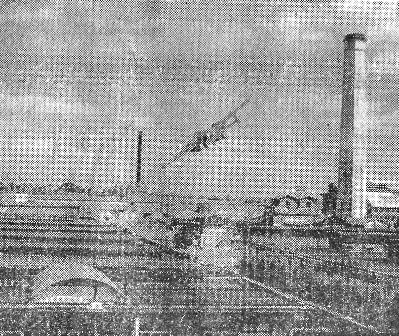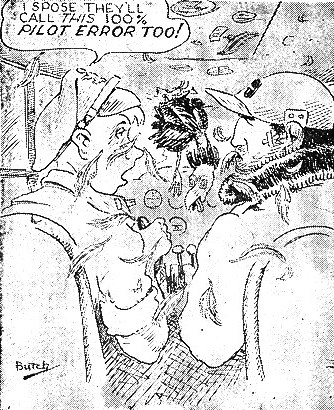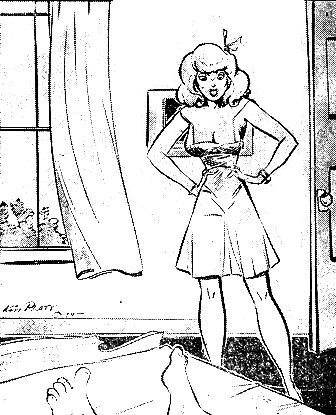
Vol. 1, No. 40 Published by India China Division, Air Transport Command October 25, 1945

| Men Eligible for Discharge As of Oct. 1 To Be Put on Stateside Orders by Nov. Division To Place All Men with 24 Months Overseas in Replacement Depots in Oct., If Centers Can Hold Them Hq., Calcutta - All ICD personnel eligible Oct. 1 for separation from the service, with the exception of comparatively few"stragglers," will be on orders to go home by the end of October, the division personnel section predicted this week. In addition, ICD shipping quotas are available to enable the division by the end of the month to place in replacement depots all men with 24 months' service, provided these centers can accommodate them, which is an unknown factor at this time. Since Oct. 1 temporary delays have developed because of changes in shipping schedules, causing replacement depots to overflow with personnel.As soon as boats arrive to relieve congestion, ICD will get a fair proportion of space to move its delayed men, it was reported by A-1. More Comfortable The only eligible men left behind by the end of the month, according to A-1, will be those who should get orders in accordance with division policy but who, for such reasons as absence from home bases because of hospitalization, get missed in the administrative application of policy. These"stragglers" won't total more than about 500, it was said. Because of bottlenecks at replacement depots, ICD is postponing scheduled closing of some bases in order to keep men at their home stations where they will be more comfortable. Total time required for leaving the theater, however, is not altered by remaining at one's home base. Get Break One factor which causes an apparent disparity in treatment of personnel from various sectors of the division is that men from China, Assam,Bengal and the rest of India all are sent to different replacement depots. Their departure from those centers depends entirely upon shipping at that particular place. Lucky breaks play an important part which ICD cannot regulate, it was pointed out. Because of a replacement depot bottleneck affecting Assam personnel in October, there will be about 400 persons delayed in their departure. Recent closing of China bases required that the division send 1,000 men to Kanchrapara, approximately 700 of them 60-pointers. These men will get a break by beating those in other parts of the division with 60 points, but the China shutdown will lighten the load of the entire division andpermit release of personnel in India as well. Eligible for separation in October are GIs with 70 points - including radio operators - and those over 35 years of age, as well as officerswith sufficient points to meet requirements under AAF letter categories and the point system. No Quota Yet From V-J Day through Oct. 17 a total of 12,586 persons left the division. By Nov. 1 it is expected that about 21,500 will remain in ICD. Ofthese approximately 13,500 will be ready to move in November, as separation eligibles with 60 points or as "surplus" personnel. There are approximately3,000 60-point enlisted men, A-1 estimated. Although as yet, there is no numerical quota for November from I-B Theater, it is believed certain, according to personnel officials, that itwill be sufficient to move the 3,000 60-point GIs and eligible officers. Total shipping quotas for the whole theater will be about 50,000 spaces, but noteven this figure is firm, it was stated. ICD expects to get its proportionate share of that number. Theater is making every effort to obtain as much shipping as possible. Radio Ops Too When 60-point and 24-month men eligible in November and "stragglers" eligible in October have been moved, then surplus personnel could be releasedif quotas were sufficient to close additional bases. The division has urged COs to follow the policy of releasing first those with longest overseas service. It was pointed out that persons in CBI are getting a better break than those in Europe and the Pacific where thousands of men with 80 and 90 pointsstill await transportation to the States nearly six months after V-E Day. To date ICD has kept up with its policy of releasing men as soon as they are eligible for discharge. The only exception was in the case of radio operators who had to be held longer. They, too, are being released now if they have sufficient discharge points, A-1 asserted. |
By S/Sgt. Bill Graham Canton - Seven years of Japanese occupation have scarred the face of Canton and left an indelible mark on the minds of its peoples. The flag of the Rising Sun has become no more than a trophy in this city where hundreds of the banners of free China are like bright flowers that bloom from atop tall buildings, on official automobiles and on the sampans in Pearl River. But the carbon-copy record of war remains. The once fine shopping district near the international settlement at Shameen is a gutted mass of crumbling stone. Naked fingers of jagged,smoke-blackened concrete and brick are a reminder of the coming of the Japs in 1938 when Chinese set fire to Canton city. Overflowing Hotels The bombings destroyed little other than factories on the outskirts. But even today a low-flying ATC plane causes the Chinese to stop inthe street with apprehensive looks to the sky. And when the plane drones on peacefully the rickshaw coolie and the man in the street turn to each otherwith broad grins. During the occupation Canton lost more than one-quarter of its two million population. But now the refugees are beginning to return.Everywhere business is booming as never before and every hotel is crammed to overflowing. Americans, including ICD's 32-man detachment which lives at the 14-story Oi Kwan hotel, have ceased to be a curiosity in most parts of the city. The crowds which once followed them on shopping tours are absent. And with their increased knowledge of Cantonese they have discovered that history has bred a strong anti-foreign feeling among some of the Chinese here. On the streets many times they hear the shout, "White foreign devil!" In other shops Chinese refuse to sell to white people. Dumped Goods But those with this hate for the Americans form the minority. Elsewhere the Yankee good nature wins friends, and the Yankee dollar hasspoken with thunder loud enough to drown out any discordant note. Shops bulge with a quantity and variety of goods such as natives of Canton say never before existed. Several months ago the Japs, near the end of their financial rope, dumped all the confiscated goods in Hong Kong on the Cantonmarket. As a result silk merchants smoke their long pipes behind mountains of brightly-colored cloth, show shops are overflowing and cosmetic and liquor counters are swamped with wares long absent from Stateside stores. For a price you can get almost anything. Nylon stockings sell for $20 American money. Every known brand of whisky is in stock and prices range from $10 for Schenley's Black label to $24 for Grand Parr. However, Americans, fleeced many times by rice wine in Johnny Walker bottles, stick to the beverages bottled by the Japanese. Diamonds are cheap and experts say most of them are genuine. The best blue-white stone of a single carat was quoted at $100 gold and a seven-carat diamond was on sale for $1,200. Back to Normal Prostitution is one of the biggest businesses in Canton today. When a man checks in at a hotel he is asked, "With or without a woman?" even asin the U.S. he might be asked, "With or without a bath?" The girls, most of them Chinese, spent the occupation living with Japanese officers. Life is fast getting back to normal. The New Asia Hotel, which since 1938 billeted the Nip army, is being reopened this month. Bridges betweenhere and Hong Kong are being repaired. Lingnan University, which operated on a limited scale during the war, is preparing to resume its full peacetimeprogram. On nearby islands the Japs are interned. But many still rove the streets of these places. Officially they have been disarmed, but soldiers wearing their samurai swords stroll about. Their overtures to a visiting American (though few actually go out to the islands) are polite but in no way reflect the attitude of a conquered people. They attempt to fraternize by inviting Yank soldiers to dinner, but they do so with an obvious displayof equality. Canton has not had an easy life during the war. But in no way could its fate be compared with the sufferings of other Chinese cities. Those with money continued to live well during the occupation. The Japs for the most part were strictly disciplined during their stay. And food was availablein reasonable quantity. Contrasted to this is the poverty of nearby Macao where the Japanese cut off all supplies. Mice became a delicacy and Chinese killed dogs in thestreets and ate them without cooking. At one of the leading hotels human bones were found in the garbage and the story is told by hundreds of how actualhuman flesh was served in the dining room. |
 Annie Anopheles won't live here anymore, if the pilot of this B-25 has anything to do with it. The pilot gave Hastings Mill ICD headquarters a good buzz job recently, to spray the area with DDT insecticide. The plane barely missed chimneys and water towers as Lt. M. L. Blakemore caught this shot. Annie Anopheles won't live here anymore, if the pilot of this B-25 has anything to do with it. The pilot gave Hastings Mill ICD headquarters a good buzz job recently, to spray the area with DDT insecticide. The plane barely missed chimneys and water towers as Lt. M. L. Blakemore caught this shot. |
GI Almost ‘Misses Boat’
In Zeal Getting Men Home
1346 BU, Tezgaon, India - ICD is overflowing with GIs who would have like to "miss the boat" coming over, but Tezgaon offers the situationin reverse - a soldier who almost missed the boat going home.
M/Sgt. Norman Gettings, Rockville, Md., former military personnel sergeant-major, was in charge of getting this base's latest quota of men started for home recently.
For two days he worked zealously, putting endorsements on service records, adjusting adjusted service rating cards and attending to all the other necessary details of a homebound GI.
A few hours before the planes were scheduled to leave for Karachi, Gettings suddenly remembered that he, too, was on orders and still had a clearance run to make. He rushed to the personnel shipping and receiving section for some clearance blanks, and found that, in his zeal at getting the other men ready to go Stateside, he had neglected to save any copies for himself.
Exact details of how the sergeant made the boat with that obstacle blocking him are still confused, but the base maintains that his speed inclearing the other GIs was nothing compared to that which he exerted at the last minute on his own clearance - with or without the required blanks.
Kanchrapara Is Tough Spot For 'Homers'
Men Do Plenty 'Roughing' At Replacement Depot No. 3, India
(Ed.-The author of "China This Week" now is on his way home. Until he departs he will continue to contribute to the EXPRESS.)
By Rus Walton
This column is for the boys in China (and maybe in India) who will go through Replacement Depot No. 3, known to most as Kanchrapara. Thecamp is a processing center, a separation depot for men who are leaving (without regrets) the I-B and C theaters for that promised land, USA.
many times in life, persons have to go through unpleasant experiences to gain a goal. Kanchrapara is one of those places and one of those times.
Forms, Forms
The first thing a newly arrived "guest" does at "K" (after a tedious and tiresome ride from Calcutta) is proceed to the big hangar on theother side of the lake. Here he is greeted, feted (with reams of new forms to fill out) and defeated (with the prospects of waiting). At his newly assignedarea (or tent city) the guest is processed.
Most obnoxious on the processing list is (1) having to fill out a duplicate Form 66-1 or 66-2 (which usually takes a couple of hours offinger-cramping, bad-on-the-disposition writing; (2) standing in line; (3) making an itemized account (in triplicate) of every article in the baggage;(4) sorting the baggage, packing and repacking (each man is allowed one large piece of baggage in the room on board ship - this does not include brief case,musette bag, typewriter, etc.); (5) standing in line for hours only to find that the medics and the finance department won't be able to initial the clearance card until the next day - they work only from 9 to 11:30 a.m. - and that the medics only gave shots at 1400; (6) being told that it will probably be three weeks to a month before the backlog is depleted and a guy can expect to be put on orders.
|
Saggy Cots
Both EM and officers are quartered in tents. When it is not raining it's not too bad, despite the fact that the tent areas are "way the hell and gone" from the mess hall, latrines, PX, etc. In one case a guy had to get to the washroom, then had to walk back to his tent and go half a milein the other direction to get to the latrine. A trip to the mess hall (to stand in line again) was almost a weekend excursion.
Some are fortunate and manage to get beds that don't sag and scrape the floor. Others are sure they can feel rats and snakes stooping over to crawl between mattress and ground. Enlisted men, when they get around to the mess hall, find that they must (1) stand in line to scald their mess gear,(2) stand in line to eat and (3) stand in line again to scald their mess gear. Officers are a little more fortunate. For rupees three, annas eight, a day,they can do without the mess gear, just stand in line to eat.
53 Is Critical
Just one of the many thousands who are waiting to get on the boat and go, the guest finds time more than heavy on his hands and after a whileall the magazines have been read through, the cards start to get soggy and soft with use and the days seem to get a little longer. If a fellow getsreal sharp, he learns just when to leave for the chow line so that the waiting will not be so long, and in a few days finds that everybody else canfigure things out, too, and so they start all over again. Most EM either shower or eat during the evening mess call. They seldom can do both.
To men with 53 points or more, this somewhat harrowing experience has its reward. Finally, they do get to go home. But under the presentsetup, men with less than 53 of those precious points can look forward to all this processing with only reassignment as the ultimate goal.
Pepi’s Rumba Band Folds As Members Return to US
Pepi Gonzalez's Rumba Band, an all-soldier group of musicians said to be the first authentic dance band of its kind to play to GI audiences inICD, was disbanded recently when the majority of its personnel returned to the States.
Organized last February, the band played over 150 shows, dances and radio programs throughout this division, traveling with ATC Entertainmentunits to perform before GI audiences, as well as giving additional paid performances. With several offers to continue as a group in the U.S., accordingto leader Sgt. Gonzalez, the band tentatively plans to get together after discharge and play to Stateside audiences.
Most of the men hail from South American countries where their type of music originates. Pepi, director and manager, went to the States from Puerto Rico in 1937, and was formerly of the Latin-American dance team, Pepi and Marquita. Assigned as draftsman with ICD maintenance, Pepi scouted the various talents of GIs in the division and organized his band.
Pianist of the group was Spanish-born Cpl. Enrique Vizcaino, former graduate and professor of music at the Royal Academy of Music at Madrid.Before the war he was featured at the Havana Madrid in New York.
The "Singing Guitarist from Mexico," Pvts. Ochoa Cisco and Ignacio Martinez, worked with a touring rumba band, and S/Sgt. Patsy Clemanti played trumpet with numerous bands in the U.S. before donning khaki.
Marimba-player Pvt. Doc Core had been billed in U.S. nightclubs as soloist. Music from the bongo drums was furnished by Pfc. Jorge Rodriguez,native of Puerto Rico.
Cuban Sgt. Luis Viner was featured on the "maracas and claves," and drummer Cpl. Jerome Levy of New York, left Ray Noble's band when he came into the Army.
The entire band, with the exception of Cisco and Martinez who are with the ASC, are members of the ATC.
 There's a "gay-ninety" touch about this luscious-looking Hollywood lass, and her newest picture as well. She's Adele Jergens, a Columbia star, and her latest release is "She Wouldn't Say Yes." A gal with curves like hers (ooh, those enticing black-mesh hose) could say "no" and still hold ourinterest! There's a "gay-ninety" touch about this luscious-looking Hollywood lass, and her newest picture as well. She's Adele Jergens, a Columbia star, and her latest release is "She Wouldn't Say Yes." A gal with curves like hers (ooh, those enticing black-mesh hose) could say "no" and still hold ourinterest! |
Karachi Reporter Proves 1306 WACs Above Army Norm
By S/Sgt. Syl Adessa
1306 BU, Karachi - Report from the Army top that statistical measurements of WACs disprove the belief that the American woman is tall,svelte and willowy plunges the cold steel of arithmetic into our illusions and is only a portent of what may come.
The Army says the average WAC is 5 foot 3 and without wishing to encourage the Army any further the reporter nevertheless yielded to the morbid urge to get the lowdown on WACs stationed at Karachi. Well, it didn't turn out badly after all.
Anthropological Query
Data, from nearly impeccable sources, show that the average Karachi WAC rises above the norm, that she is 5 foot 5, to be precise. His appetitefor figures wetted, the scribe pursued the investigation a bit farther. Though he came out with a scratched face and a smear of lipstick, he is in aposition to reveal the following delectable facts: that the bust of the average WAC here is 34, that her waist measure 26 and that her hips come to a neat 35.
The fact that the AW is, after all, short and dumpy and not Rosalind Russell is only a straw in the wind. The most cherished myths aboutthe North American female now may go crashing and tumbling before the march of scientific army research and the inexorable marshalling of facts.
When American women responded to the Army call they did so for patriotic reasons. Were they informed they'd be made the object ofanthropological investigations? Were they told that some of the most closely guarded secrets of our time were to be spread broadcast? They were not,and the Army is a boor to go around and tell.
More Fun
But that 5 foot 3 figure sticks in our craw. We can only look upon this business of irresponsible disclosure with the utmost alarm. Are we tobe spared nothing? Are we to be given the painful details of bicep measurements, chest expansion, arm reach and muscular tone?
We've lived in a fool's paradise all these years. Our notions of womanhood were taken undiluted from the ads, the movies, the slick-papermagazine stories. And now Gen. Marshall or Sec. Stimson or someone comes out and says no, the American gal is just a 5 foot 3 dumpling - Karachi WACsexcepted.
Of course, we always suspected the truth. It was placing an excessive burden on the law of averages to explain why we were inevitably stuckwith five-foot-three-ers on blind dates. And our regular night prowling rarely topped the average. But, somehow, we think it was more fun NOT to know the truth.
Dum Dum Opens 24-Hour Snack Bar For Homebound GIs
1305 BU, Dum Dum, India - With the increase of transient personnel at this base, supply abs services has opened a new 24-hour snack barand cigaret counter to augment existing facilities and to service men arriving and leaving during the night.
Operated by three enlisted men and four civilians, the new service offers cokes, coffee, sandwiches, hamburgers and various other edibles aswell as cigarets. An additional feature of the all-night establishment is free shoe-shine service to homebound GIs.
The line mess has been moved to approximately 50 yards from the terminal.
 1306 BU, Karachi - Amateur archaeologist and jungle-explorer on the side, Pfc. Zita Machinsky, who works in the base photo lab here, picked upthis interesting fossil while on DS at Jiwani. Everybody said it was a whalebone, and who are we to disagree? 1306 BU, Karachi - Amateur archaeologist and jungle-explorer on the side, Pfc. Zita Machinsky, who works in the base photo lab here, picked upthis interesting fossil while on DS at Jiwani. Everybody said it was a whalebone, and who are we to disagree? |
India GIs Find Hindu Puja
Mixture of Xmas, Carnival
Calcutta - To the Hindus of Bengal the four days beginning Saturday, Oct. 13, were the greatest religious ceremony of the year. To theGIs it seemed a combination of Christmas and the country fair.
In the cities, great crowds jammed the streets during the "Puja." Stores were filled with children's toys, bright colored sarees, gold and silver ornaments - presents for all the family just as they have in Stateside stores at Christmas.
Trinket Booths
In every little community an image of the "ten-armed goddess of protection," Durga, whom the Hindus worship "in the autumn," sat on a pedestalunder a protecting canopy. Surrounding many of these were booths of trinket sellers and the Indian version of American hot dog and hamburger stands.Miniature merry-go-rounds and ferris wheels brought pleasure to the children.
On the fourth day of the Puja the goddess was removed from her pedestal, placed on trucks or the shoulders of a group of coolies, dependingon its size, and precessions led by drummers and followed by worshipping throngs threaded through the streets.
Immersion Windup
In the evening as the precessions grew in size, traffic came almost to a standstill - and there was far more traffic than usual as cars thathad not been used for months were on the streets and practically all gharries were in use. Beautiful olive-skinned maidens, who generally stay closeto home, flirted boldly with their eyes as they passed GIs. The next day, the same maidens would step demurely behind their husbands or fathers and castdown their eyes as GIs passed - as they are in the habit of doing about 364 days a year.
After parading through the streets the processions headed for the sacred waters of the Ganges, and its tributary, the Hooghly, where the imageswere immersed officially ending the greatest of the Hindu Pujas.
 |

Not a Package or a Pill
Perhaps among the most serious obstacles standing in the way of "permanent" peace are its intangibility and the intangibility of the various means of achieving it.
When scientists set to work several years ago on the secret of atomic energy, they knew pretty well what they were looking for. They wereworking on something tangible, if sinister and formidable.
Along the line of their quest, they met pitfalls. Anyone seeking anything worthwhile usually stumbles into pitfalls. But the scientists hadtangible encouragements from time to time, hints that they were on the right track.
Their hearts and minds always were set on one goal - a small package of death and destruction so terrible that it immediately would bringto his knees any adversary, regardless of his might. True, the researchers may have been working on a broader goal - harnessing of this same atomic energyfor useful purposes - but the immediate goal was destructive power, tangible, terrible destructive power.
The quest for peace, however, is something on which once can't exactly place his finger. The goal cannot be found in unchanging formulas. The steps along the road to peace can't be placed under a microscope or subjected to the acid test of hard, cold mathematics. Then too, no one can be certainthat any particular step is the right one. The only measurement of peace is its loss. When the war starts, then one is sure he was off the track somewhere along the line.
Atomic energy, in the form developed thus far, is a destructive package. No less destructive, perhaps, are some of the more ethereal tinder boxes which lie around the world - racial prejudices, starvation, dishonesty in high places, militaristic lust for power, diplomatic intrigue. These area few of the real, if intangible, threats to peace.
Yet peace will not be found in a package, like the atomic bomb. Researchers will find no specific formula which will yield a little peace-pillto end wars. Peace just isn't like that.
Students of peace - as yet there are no professors -
 |
|
From where we sit, it looks like it's high time to get our house in order, to start at the bottom in building for peace. No edict orpronouncements from the conference table and no amount of wishing or talking are going to assure peace. They may help to point the way to peace, but thegoal will not be achieved until selfishness - personal and national - is overcome.
No, peace will not be found in a pill or a package. But it can, and must, be found if the world is to survive. Now that the atomic package HAS been developed, peace MUST be found. The incentive to live must be the driving force which will motivate men to find freedom from that which leads towar. Its importance will overshadow any prior discovery.
 "But, Darling - don't you have any OTHER postwar plans?" "But, Darling - don't you have any OTHER postwar plans?" |
Will End Operations
Over Hump Nov. 15,
Tunner Tells Press
ATC's "Over the Hump" cargo operations will be ended by Nov. 15, Brig. Gen. Tunner announced last week at a press conference in Washington,stating that the line was being maintained only long enough to bring out Americans stationed in China.
The commanding general estimated that out of 70,000 Americans in China at the end of hostilities, about 15,000 were flown out in September,and 30,000 were making the trip in October.
In the earlier phases of the operation, Gen. Tunner stated, the cost was approximately one life for every 100 trips across the Himalayas. Later on, with the enforcement of safety measures and familiarity with the route, only one life was lost in every 700 trips.
Move Mail Backlog From Casa by Boat
Hq., Calcutta - The backlog of States-bound mail from this theater at Casablanca was moved last week by diverting 35,724 pounds of letter mail to water transportation, it was announced this week.
The mail became backlogged because of the number of POWs that were taken home by air.
HUMP EXPRESS is the official newspaper of the India-China Division, Air Transport Command, APO 192, c/o Postmaster, New York, N.Y., and is published by its Public Relations office. Camp Newspaper Service and Army Newspaper Servicefeatures are used, reproduction of which is prohibited without permission of CNS and ANS, 205 East 42nd St., New York, 17, N.Y. Other material is submitted by staff members, ICD-ATC base Public Relations sections and other soldier correspondents. Printed weekly by the Hindusthan Standard, 3 Burman St., Calcutta, India, and distributed each Thursday. Passed by U.S. Press Censor for mailing.
| Military transport schedules over India for cargo, personnel and mail . . . maximum tonnage of essential war materials over the Hump . . . movement of troops and supplies in support of tactical operations in China . . . evacuation of the sick and wounded - these are the missions of ICD-ATC. |

OCTOBER 25, 1945
Original issue of HUMP EXPRESS shared by Barbara Skinner Lipiew
A similar, better quality image of Adele Jergens was used in this recreation
Copyright © 2018 Carl Warren Weidenburner
TOP OF PAGE PRINT THIS PAGE ABOUT THIS PAGE E-MAIL YOUR COMMENTS
PREVIOUS ISSUE HUMP EXPRESS BASE NEXT ISSUE